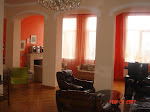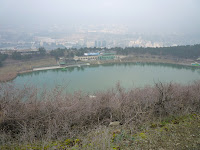Notes on Arajalla: Part 1
January 26, 2010
I’ll split my thoughts about the next school into two parts so the post doesn’t become too long.
We left the main road between Tblisi and Rustavi, turning eastward across a very flat plain that held scattered flocks of grazing sheep. In several miles we came to the Azeri village of Arajalla. The unmarked streets were unpaved allies and closely flanked by the walls of houses and yards. Blue metal gates indicated where courtyards existed.
Perhaps in Italy or Greece these narrow, rural alleys would have had charm. And perhaps on a mild fall day they would have appeared inviting. But, on this day, I found no invitation from the scene.
The school we were visiting
appeared isolated in a field beyond the walls of the yards and houses—a lonely and unkempt structure.
In some ways, this school seems prototypical of the Georgian school—a concrete square in layout, three stories, hipped roof. Georgia has over the last decade seen a huge decline in students from what once was about 900,000 students to 600,000 (check on this). Consequently, many of these schools, like this one, have few students. This one has 197 students according to the principal. There are 32 teachers.
The picture below is taken in the staff room, the only warm room in the school. It is warm because an old leaky wood stove is burning briskly. The women first on the left are Nano and Rita and then an English teacher who wishes to do an exchange in the US then the principal and then me. The men that you can make out are Azeris. The women are Georgian.
This picture was taken a little after 1. There are no children as they have gone home for the day. School starts at 8:30 and ends around 1:30 although this day it had already ended. Most of these teachers are paid for 18 hours a week (less than 4 hours of paid time per day). For this they are paid 18 lari an hour (324 lari). So they make about $190 a week.
The school has more problems than the principal could articulate or that I could understand. She proudly showed us her computer lab, a room on the northeast side of the building. Strong winds were sending drafts of cold air through this room. It did, as did all the classrooms, have a rickety wood stove that would heat it when students were using it.
This is a picture of Nano and myself pretending to warm our hands. Sadly, there is no connection to the internet and there is barely any educational software for teachers to use with these computers.

































